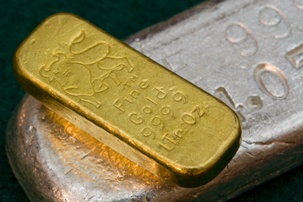Arizona Senate Passes Law Recognizing Gold, Silver As Legal Tender

It’s yet to be signed by Governor Jan Brewer, but if it becomes law Utah would be the second state in the union to have one. Utah passed a similar law in 2011, and apparently Kansas and South Carolina are considering similar legislation.
Arizona is returning to its gold rush roots with a bill that would make precious metals legal currency.
The GOP-led Senate gave final approval Tuesday to the bill that could make Arizona the second state in the nation to recognize gold and silver as legal tender. If signed into law by Gov. Jan Brewer, the measure would take effect in 2014.
The state Department of Revenue opposed the measure. It passed in the House only after an amendment was added to exempt the department from having to accept gold or silver as tax payments.
Naturally, the big-government types are upset about it:
The measure reflects a growing distrust of government-backed money amid the declining value of the dollar, according to proponents. Republican Rep. David Livingston of Peoria, a financial adviser who ushered the legislation through the House, said his clients were eager to tap into their gold and silver reserves.
But Democrats, who voted against the measure in the Senate and House, said it sends a false message to constituents that gold and silver are safer than traditional currency.
“Government type generally don’t like any kind of legal tender currency they can’t merely print more of as needed,” writes Stephen Kruiser.
The US constitution does not allow the states to print their own money, but it also provides that states may not “make anything but gold and silver coin a tender in payment of debts,” which would specifically allow for this sort of legislation.
Though I’m not sure what’s stopping private individuals and businesses from accepting gold and silver as payment now.
In Texas, lawmakers are considering creating the Texas Bullion Depository which would allow citizens to deposit gold and silver, and then exchange “depository notes” for goods and services. Which would essentially be a de facto currency.
Sound crazy? Maybe it is. But why not the market decide if these sort of things will work? Certainly a little competition for the poorly-managed US dollar, which is forever being watered down to facilitate federal profligacy, isn’t a bad thing.







